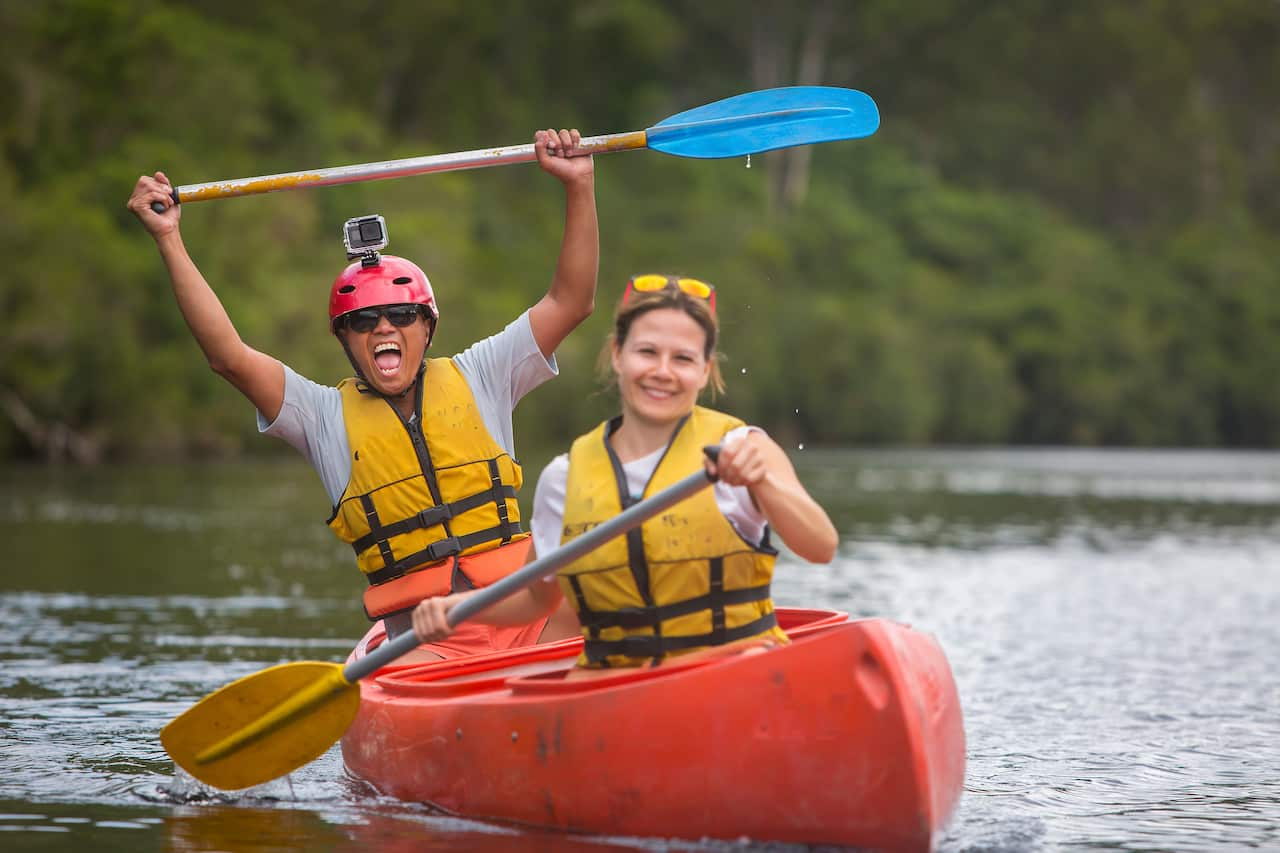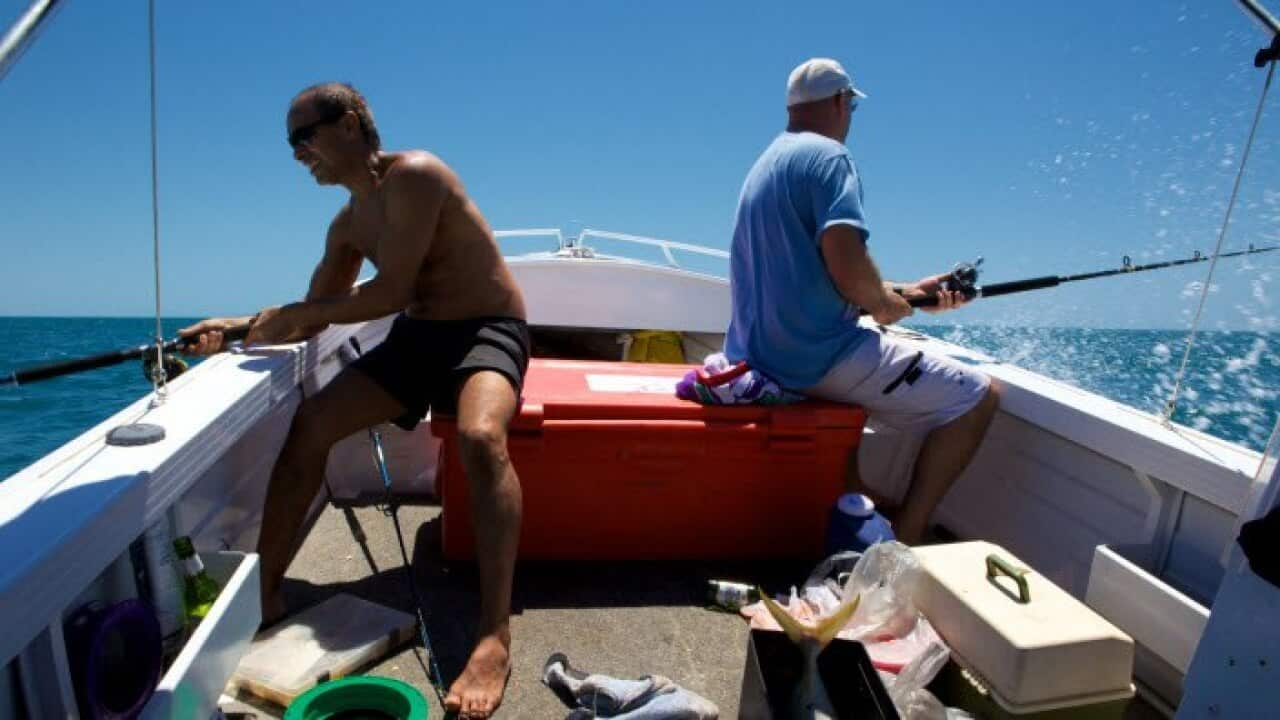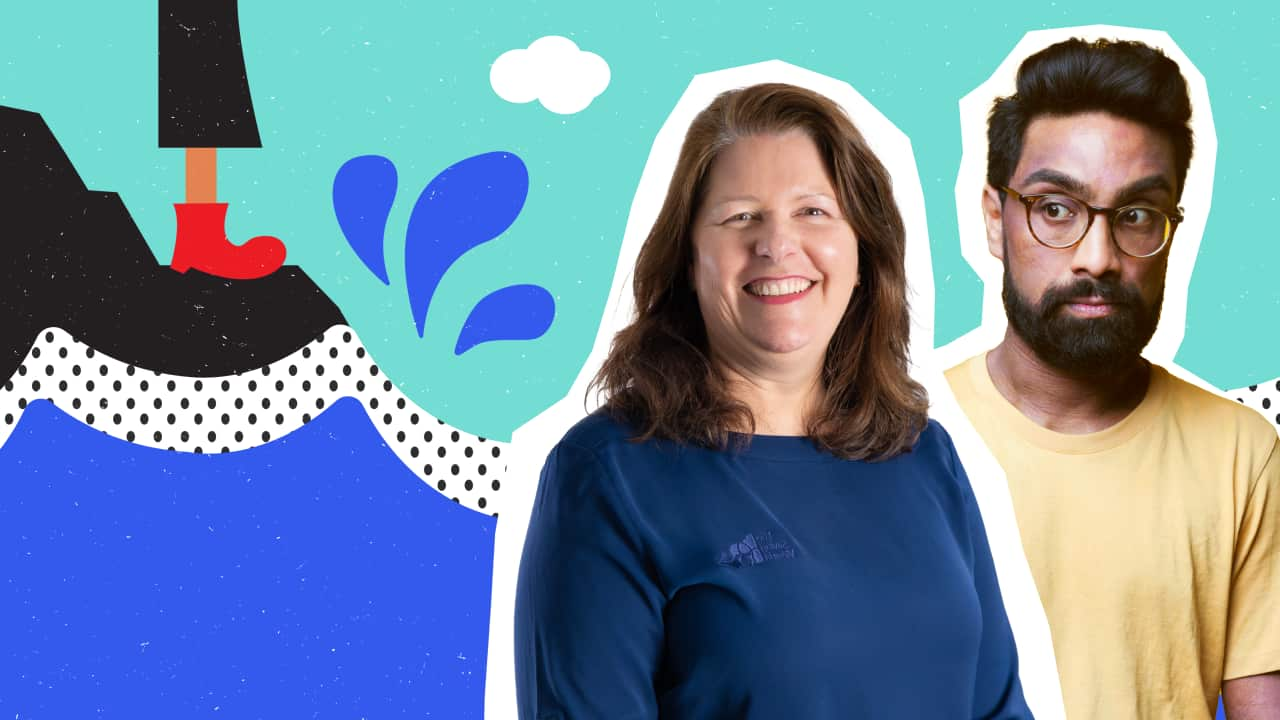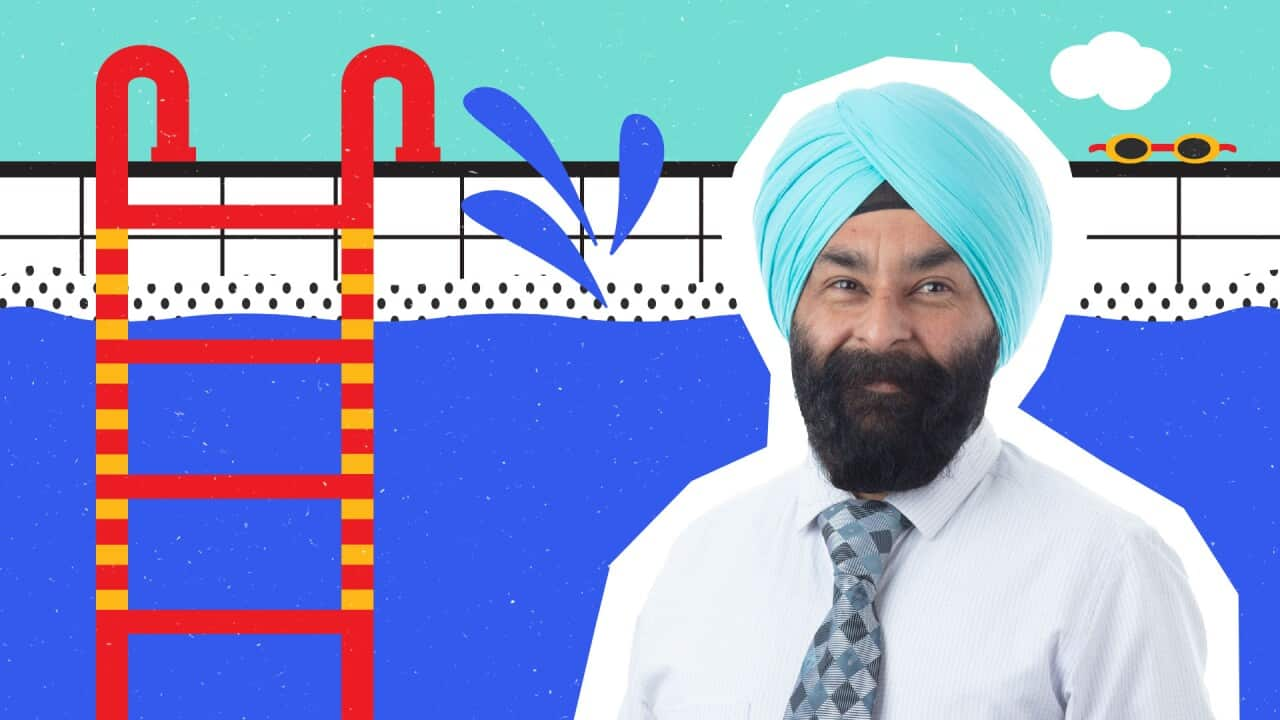spk_0
We'd like to acknowledge the Traditional Owners of the land we're recording from. We pay our respects to the Wurundjeri Woi Wurrung people of the Kulin Nation and their Elders, past and present. We also acknowledge the Traditional Owners from all Aboriginal and Torres Strait Islander lands you're listening from.
spk_1
When I was about 8 years of age, my mother was a community nurse in Brisbane, and she met an older fellow called Mr Goldsmith, who was a member of the Oxley Sailing Club on the Brisbane River.
spk_1
We hadn't been boating at that point, but my brother and I and my sister, we all loved the outdoors. We were capable swimmers. Mum came home full of this idea of, hey, why don't we go to the sailing club?
spk_1
And I found it a an incredible experience because of the, the welcoming nature, people of all ages and all abilities, and there were people from all the economic backgrounds too, so there were people who obviously had money with a beautiful flashy boat.
spk_1
We certainly weren't that. We had the cheapest boat we could find that would fit my brother and me into it.
spk_1
I think at the time it cost $50 to give you a sense of how luxurious it was.
spk_1
We were crammed into it.
spk_1
But we absolutely love that experience.
spk_2
Suren, can you hear my voice? I'm excited.
spk_2
Yeah, this is the perkiest you've been at the start of an episode. A little bit more comfortable around the water, to be honest. That's really exciting.
spk_2
That shows serious progress. Although I've gotta say, Sashi, today I'm not really feeling like being in the water.
spk_2
Well, you don't always have to be in the water, sometimes you can be on the water. On the water, what do you mean? There's kayaking, there's water skiing, wakeboarding...
spk_2
Yeah, or just being on a boat. Do you have any experience with boats?
spk_0
Um, I remember once I was at trivia and uh I didn't know what a catamaran was. That's probably it.
spk_2
Yeah, I did catamaran lessons in high school for sport one time and I remember the boom swung around and struck the instructor and I was like wow, I'm not good at this.
spk_0
I don't even know what a boom is. I'm not a great person to talk to about boats, but I do like being on boats, uh, because a part of the scuba diving is that you always take a boat out to the location that you're diving in, and I really like that. It's a really nice part after you finish a dive,
spk_2
taking that journey back to shore. Yeah, but let's talk to someone who actually knows what they're doing. Do you want to talk to a friend who is a sailor?
spk_0
A sailor, is that still a job?
spk_2
Yeah, like in the song, like a sailor what do we do with a drunken...
spk_2
OK, he won't like that one.
spk_0
I'm Suren Jayemanne. I'm a 2nd generation Sri Lankan Australian. I'm a comedian, writer and actor, and in this series, I'm learning how to get familiar with water.
spk_2
And I'm Sashi Perera. I'm also a 2nd generation Sri Lankan, Australian comedian and writer, but I love the water. I think it's such an important part of life to be comfortable around it.
spk_2
However, I'm also learning stuff on this podcast, and I reckon you should come along with us for the journey.
spk_0
This is Head Above Water, an SBS podcast where we explore water culture and water safety in Australia. If you don't know your boat tinnies from your beer tinnies, well, this is the show for you.
spk_2
If you're not that keen on being in the water, then this episode might be the one for you.
spk_0
Yeah, picture a gorgeous sunny day and you want to be out on the water, but you don't want to swim or surf, well, maybe what you really want to be is on a boat.
spk_2
But what do you need to know before you climb aboard? Are you familiar with the safety equipment you need, what kind of license you need, the speed limit out on the water?
spk_0
I don't know the first thing about boats, Sashi.
spk_0
I think it's time to call in an expert.
spk_1
I was bitten on the first, my first day out with an older hand teaching the young kids how to sail, um, my first ever time, and I was just absolutely captivated by the power that the wind had.
spk_1
To propel a vessel, anything, to propel this us across the water, sitting in this boat, and the fact that the, when the breeze filled in, and the sails captured that breeze, the boat leaned over with the energy of that force that's invisible.
spk_1
And I just found the whole thing magic and I'm still captivated by it today.
spk_2
This is Neil Patchett.
spk_1
I'm the general manager of the Boating Industry Association in Australia. My role is government and public relations within that group.
spk_2
The boating industry in Australia is quite large actually. It employs 35,000 people.
spk_1
Our mission is to promote the activity of boating and to do it so that people are safe, responsible, and having a great time.
spk_1
But also supporting our members across the country through advocacy, through services, and a lot of it has to do with encouraging pathways into careers in the marine sector.
spk_3
Obviously you're very passionate about the water. I guess you've made a career out of sort of sharing that passion with newcomers. What is it about boating that you enjoy sharing with people who've never done it before?
spk_1
Oh look, I think to build on that experience I, when I was really young about just to be able to be propelled across the water by, by wind.
spk_1
The whole boating experience, whether it's paddling, sailing, or in a powerboat, is truly a fantastic experience, and there's recent research has been done over the last 10 years which actually literally proves that boating is good for you.
spk_1
The effect is called blue mind.
spk_1
It's the way your, your feel-good hormones, things like dopamine, serotonin, and oxytocin are stimulated, in that experience, in, on, around and under the water, literally activates your feel-good hormones.
spk_1
And that explains why my experience when I was 8, that explains that. And there's a, a scientist in the US who's done this research, and it validates what boaters know, but it's a good thing for us in today's society where there's so much stress and pressure that literally the stress hormones are reduced when you get out on the water, and it doesn't have to be literally on it. As I say, you could be beside it, under it, swimming, scuba, snorkeling, sailing, paddling, whatever it is.
spk_1
That from a social benefit point of view is very real.
spk_3
I've been on my own journey through this series, cos I, you know, starting out as someone who, who wasn't comfortable in the water, who didn't know how to swim, I've been able to experience different environments and different activities, but for me, boating is something I know nothing about. Uh, one of my friends is keen to take me out on the water in the next few weeks. What do you think I should be thinking about? What should I be sort of preparing for before we head out on the water?
spk_1
Any experience on the water, I'm a keen surfer as well, and a windsurfer.
spk_1
And all of those things, anything outdoors in this country, my advice to anyone, the very first thing you do is check the weather, and you should check it before you go to make sure it's suitable for you, and your ability and also the vessel you're in.
spk_1
If you're going out on an ocean liner, it's not such a big deal.
spk_1
But if you're going out on a small tinny or a small kayak or a canoe or with a friend, different story.
spk_1
You need to make sure the weather's right for that sort of vessel and your ability, and there's an old rule, if you're in doubt, don't go out.
spk_1
But it's about making sure you know your, your limitations, your own limitations and the vessel, and balance that against the conditions of the day.
spk_3
In the conversations that I've had during the series, there's one thing that keeps coming up, and that is life jackets. Can you tell me a bit about why life jackets are so important in the first place?
spk_1
Life jackets are an essential piece of safety equipment in Australia from the boating regulator's point of view and also the industry. The safety of people when they get out on a boat. The most important safety item is the vessel itself, to stay with it at all times, even if you get swamped and the vessel's semi-submerged. Best to be with it.
spk_1
The next most important piece is the life jacket, and today we're extremely lucky because there's been a lot of design work over the last 10 years to improve the wearability and comfort of life jackets, and you can get them in two basic types a foam one, which doesn't need a lot of care and attention, or an inflatable, which requires specific care and attention and servicing every year.
spk_1
But the difference in wearability and comfort of those new inflatable types is extraordinary. They, you can wear them all day without being out of, you know, discomfort.
spk_1
They're highly wearable. They kind of look cool as well these days, which is completely different to 20 or 30 years ago when parents would put a giant lump of foam around your head or like on your back, on your chest. We call them a block of cheese life jacket, those old school ones which basically are a bit of a deterrent to people to actually wear them.
spk_3
When I go on this boat, I'm pretty sure I'm not gonna be in control of the boat. I think someone, there'll be someone who knows what they're doing, but if I'm on there just as a passenger, what should I be thinking about? Is there anything I need to know?
spk_1
Yeah, look, it's, like I say, it's safety equipment. Every boat is required to carry life jackets, but there is also other safety equipment. So whoever is the, the owner of that boat, let's call it the skipper.
spk_1
It's their responsibility, literally in law, to be responsible for everyone on that boat and for the safety of the boat. So, if you're going out with family, friends, or a connection and they say, come out in our boat for the morning or the afternoon or the day, you, you need to know that they're responsible. So they should be, you should be able to ask them, hey, you've got all your safety equipment? Have you got life jackets, everyone? And the answer should be yes, yes.
spk_2
Suren, everything Neil's talking about is about being a passenger. Does any of this make you want to be a skipper yourself?
spk_0
I mean, the name Skipper.
spk_0
I, if you can call me captain, then yeah, I'm, I'm excited, but skipper, wow.
spk_2
So the name alone would throw you off.
spk_0
Yeah, I'm a very, yeah, I'm pretty um sort of vain.
spk_0
And, and I like to be perceived, I like status, and skipper doesn't feel like it's got a lot of status. Also, especially there's one thing that I'm a bit nervous about, and that is that the captain always has to go down with the boat.
spk_2
Yeah, I watched Titanic, that's all some pretty serious stuff. Maybe a skipper doesn't.
spk_0
Yeah, you just skip on past the women and the children.
spk_2
OK, what did Neil tell you about becoming a skipper?
spk_0
Well, I did ask him about it actually, let's have a listen.
spk_1
There are training programs across the country because generally if you want to operate a powerboat at speed, let's say above, generally it's above 10 knots, which is when a boat starts to plane on the surface, you're required to have a boat driver license generally across the country. Most states allow you to learn the
spk_1
theory yourself and you can study a little book and sit a test and if you pass, you get your license, or you can go to a training provider, a registered training provider that's done on an equality system who'll teach you more than just the theory. They'll teach you the handling as well as the theory and how to be safe and know what to do and give you a deeper understanding and appreciation. There are lots of them across the country.
spk_1
They're called registered training providers for a boat driver license, and that's, we highly recommend people think about that as a way to get that initial skill.
spk_3
When I'm on the boat, I won't be behind the wheel. Does that mean I can have a couple of beers? What, what's the rules with alcohol?
spk_1
They're similar to the roads. Uh, basically, the driver has to keep under 0.05 blood alcohol limit.
spk_1
The rate of breaches of that in boating is dropping all the time, so we encourage, we work with the regulators that advise people not to drink and drive on the water.
spk_1
Particularly in boats because the conditions can change so radically. So you need to be ready to go at any time. But for passengers, it's a different story. But it's not a bad thing for everybody on board to, to be sensible when it comes to alcohol. This is the part from the skipper themselves, because you never know, you might actually have to lend a hand. If the conditions turn at any moment and you've got to get yourself out of a tricky spot, it may take more than just the skipper to do it. So, it's not a great idea to go and party hard
spk_1
and you become intoxicated, but you know, to get out there and enjoy yourselves is the number one rule, and do so responsibly so you can have a great time and get home and tell people about the wonderful time you had.
spk_3
Yeah, it sounds like you'll be getting a natural high anyway with the, from the, the blue mind effect.
spk_1
Um, yeah, totally. So I can't stress that enough that the fact that the, the opportunity that that every Australian has irrespective of their budget, the wallet, like I say, it doesn't matter these days. You can get a small kayak for just it's literally a couple of $100 for small kayaks.
spk_1
Right through to the sky's the limit, of course, but it's such a, we're so blessed in this country with the range of waterways from lakes, rivers, dams, estuaries to coastal sections, coastal areas, and the opportunities for recreation, whether it's tow sports or through to boat-based fishing, which is enormously popular.
spk_1
The options to spend your time in a beautiful way with your family and friends are extraordinary in this country, we're very, we're very lucky.
spk_0
That's Neil Patchett, the general manager of Australia's Boating Industry Association.
spk_2
What a great interview. What's your main takeaway, Suren?
spk_0
Well, I really liked when Neil was talking about the blue mind effect. Have you ever heard of that before?
spk_2
I hadn't actually. Yeah, and it makes so much sense that just being out on the water itself is so calming and so um, I don't know, I guess meditative.
spk_2
It's really nice to have a name for what I feel when I'm near the water. I genuinely just feel better.
spk_2
Next time on Head Above Water, we're taking you out onto the rocks.
spk_0
Why would we do that? I love these listeners. It's not a threat, Suren, we're going rock fishing.
spk_0
Oh, OK, well that makes more sense. Hey, isn't rock fishing pretty dangerous?
spk_2
It can be. So I'm going to link you up with someone who knows the dangers better than almost anyone in Australia.
spk_4
For some people it's about the type of fish that they can catch, and at certain times of the year, there's different types of fish. For other people, it's about the adrenaline rush, because you are right in there amongst the elements and there's, you know, often high waves and that sort of thing, which does make it dangerous, obviously.
spk_0
Head Above Water is a miniseries of the SBS Australia Explained podcast. Whether you're trying to wrap your head around Australian slang or trying to stay safe from our wild weather, Australia Explained is a great place to start. Just follow the show in your favorite podcast app.
spk_2
And if you have any questions or topic ideas, send us an email. The address is australiaexplained@sbs.com.au.












